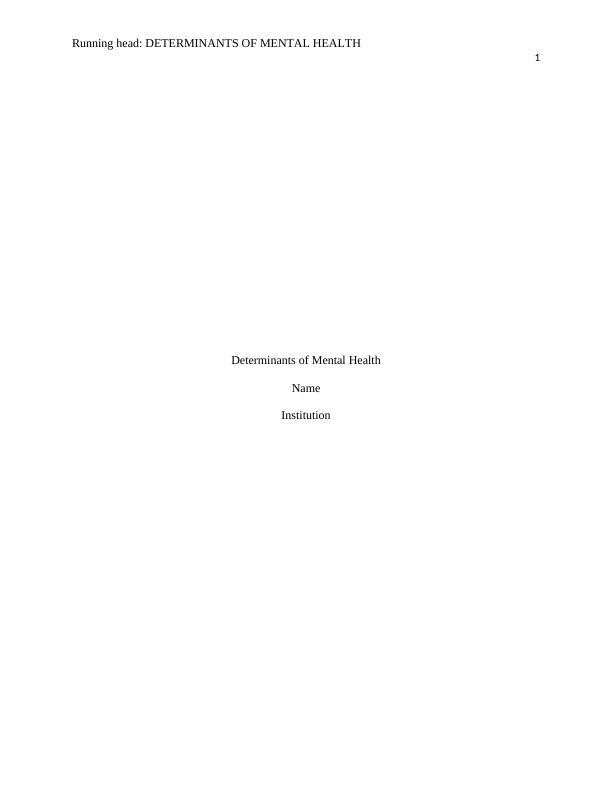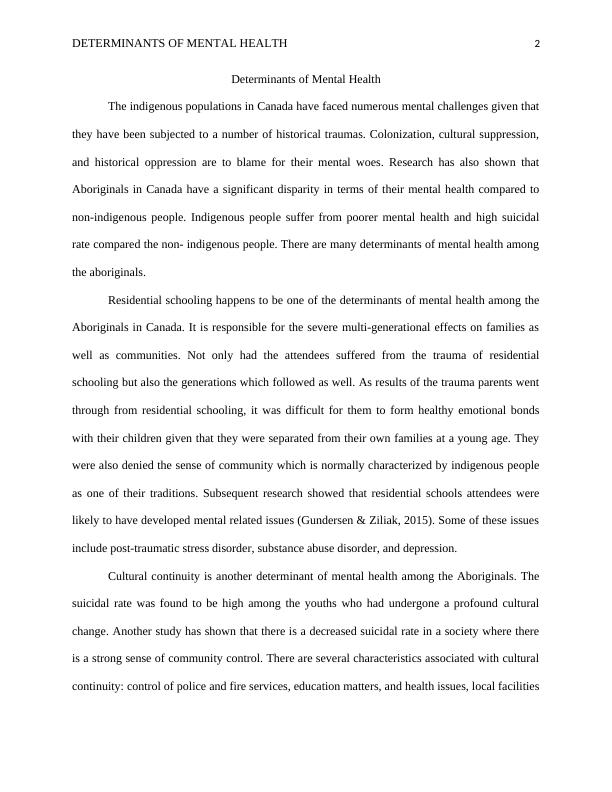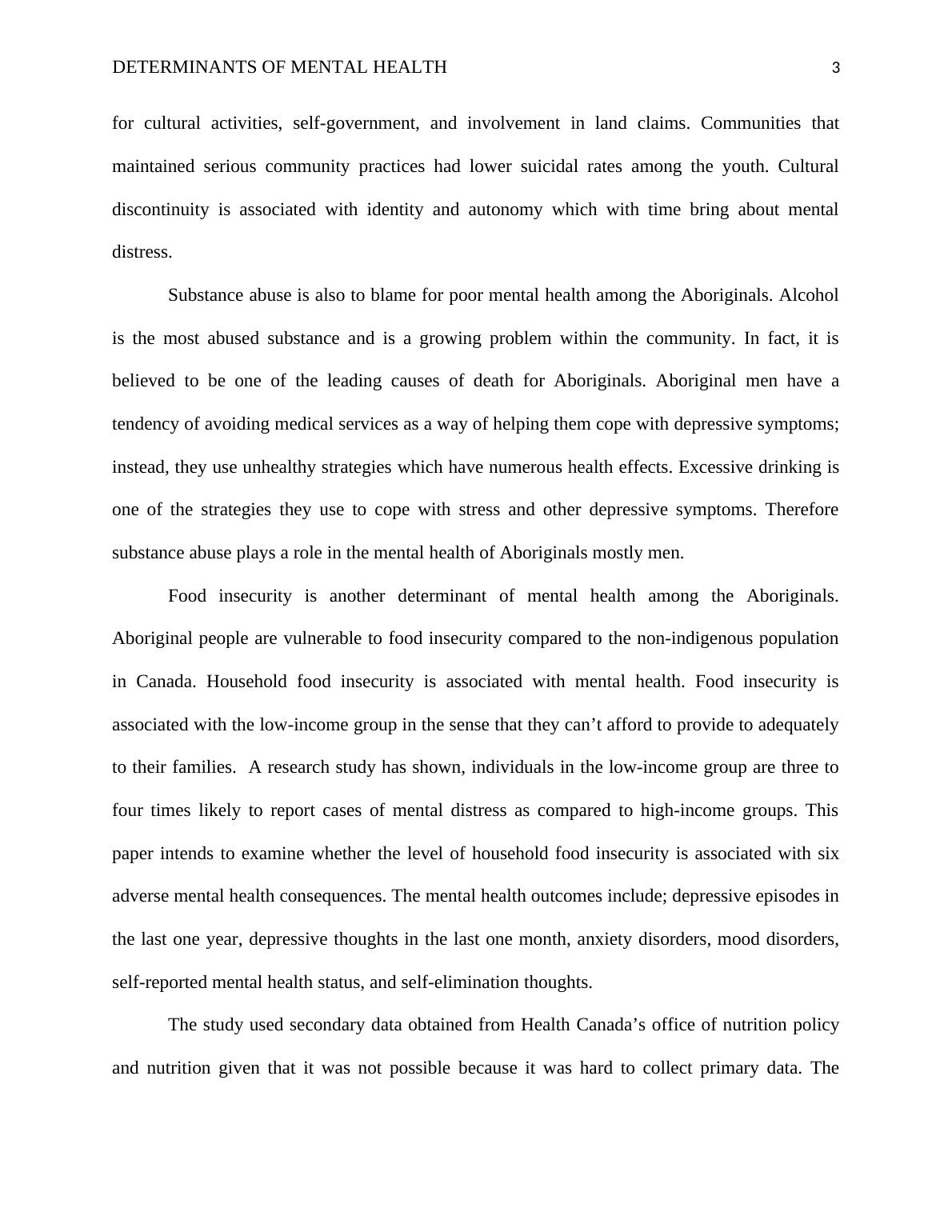Determinants of Mental Health in Aboriginal Communities
Added on 2023-04-25
10 Pages2877 Words425 Views
Running head: DETERMINANTS OF MENTAL HEALTH
1
Determinants of Mental Health
Name
Institution
1
Determinants of Mental Health
Name
Institution

DETERMINANTS OF MENTAL HEALTH 2
Determinants of Mental Health
The indigenous populations in Canada have faced numerous mental challenges given that
they have been subjected to a number of historical traumas. Colonization, cultural suppression,
and historical oppression are to blame for their mental woes. Research has also shown that
Aboriginals in Canada have a significant disparity in terms of their mental health compared to
non-indigenous people. Indigenous people suffer from poorer mental health and high suicidal
rate compared the non- indigenous people. There are many determinants of mental health among
the aboriginals.
Residential schooling happens to be one of the determinants of mental health among the
Aboriginals in Canada. It is responsible for the severe multi-generational effects on families as
well as communities. Not only had the attendees suffered from the trauma of residential
schooling but also the generations which followed as well. As results of the trauma parents went
through from residential schooling, it was difficult for them to form healthy emotional bonds
with their children given that they were separated from their own families at a young age. They
were also denied the sense of community which is normally characterized by indigenous people
as one of their traditions. Subsequent research showed that residential schools attendees were
likely to have developed mental related issues (Gundersen & Ziliak, 2015). Some of these issues
include post-traumatic stress disorder, substance abuse disorder, and depression.
Cultural continuity is another determinant of mental health among the Aboriginals. The
suicidal rate was found to be high among the youths who had undergone a profound cultural
change. Another study has shown that there is a decreased suicidal rate in a society where there
is a strong sense of community control. There are several characteristics associated with cultural
continuity: control of police and fire services, education matters, and health issues, local facilities
Determinants of Mental Health
The indigenous populations in Canada have faced numerous mental challenges given that
they have been subjected to a number of historical traumas. Colonization, cultural suppression,
and historical oppression are to blame for their mental woes. Research has also shown that
Aboriginals in Canada have a significant disparity in terms of their mental health compared to
non-indigenous people. Indigenous people suffer from poorer mental health and high suicidal
rate compared the non- indigenous people. There are many determinants of mental health among
the aboriginals.
Residential schooling happens to be one of the determinants of mental health among the
Aboriginals in Canada. It is responsible for the severe multi-generational effects on families as
well as communities. Not only had the attendees suffered from the trauma of residential
schooling but also the generations which followed as well. As results of the trauma parents went
through from residential schooling, it was difficult for them to form healthy emotional bonds
with their children given that they were separated from their own families at a young age. They
were also denied the sense of community which is normally characterized by indigenous people
as one of their traditions. Subsequent research showed that residential schools attendees were
likely to have developed mental related issues (Gundersen & Ziliak, 2015). Some of these issues
include post-traumatic stress disorder, substance abuse disorder, and depression.
Cultural continuity is another determinant of mental health among the Aboriginals. The
suicidal rate was found to be high among the youths who had undergone a profound cultural
change. Another study has shown that there is a decreased suicidal rate in a society where there
is a strong sense of community control. There are several characteristics associated with cultural
continuity: control of police and fire services, education matters, and health issues, local facilities

DETERMINANTS OF MENTAL HEALTH 3
for cultural activities, self-government, and involvement in land claims. Communities that
maintained serious community practices had lower suicidal rates among the youth. Cultural
discontinuity is associated with identity and autonomy which with time bring about mental
distress.
Substance abuse is also to blame for poor mental health among the Aboriginals. Alcohol
is the most abused substance and is a growing problem within the community. In fact, it is
believed to be one of the leading causes of death for Aboriginals. Aboriginal men have a
tendency of avoiding medical services as a way of helping them cope with depressive symptoms;
instead, they use unhealthy strategies which have numerous health effects. Excessive drinking is
one of the strategies they use to cope with stress and other depressive symptoms. Therefore
substance abuse plays a role in the mental health of Aboriginals mostly men.
Food insecurity is another determinant of mental health among the Aboriginals.
Aboriginal people are vulnerable to food insecurity compared to the non-indigenous population
in Canada. Household food insecurity is associated with mental health. Food insecurity is
associated with the low-income group in the sense that they can’t afford to provide to adequately
to their families. A research study has shown, individuals in the low-income group are three to
four times likely to report cases of mental distress as compared to high-income groups. This
paper intends to examine whether the level of household food insecurity is associated with six
adverse mental health consequences. The mental health outcomes include; depressive episodes in
the last one year, depressive thoughts in the last one month, anxiety disorders, mood disorders,
self-reported mental health status, and self-elimination thoughts.
The study used secondary data obtained from Health Canada’s office of nutrition policy
and nutrition given that it was not possible because it was hard to collect primary data. The
for cultural activities, self-government, and involvement in land claims. Communities that
maintained serious community practices had lower suicidal rates among the youth. Cultural
discontinuity is associated with identity and autonomy which with time bring about mental
distress.
Substance abuse is also to blame for poor mental health among the Aboriginals. Alcohol
is the most abused substance and is a growing problem within the community. In fact, it is
believed to be one of the leading causes of death for Aboriginals. Aboriginal men have a
tendency of avoiding medical services as a way of helping them cope with depressive symptoms;
instead, they use unhealthy strategies which have numerous health effects. Excessive drinking is
one of the strategies they use to cope with stress and other depressive symptoms. Therefore
substance abuse plays a role in the mental health of Aboriginals mostly men.
Food insecurity is another determinant of mental health among the Aboriginals.
Aboriginal people are vulnerable to food insecurity compared to the non-indigenous population
in Canada. Household food insecurity is associated with mental health. Food insecurity is
associated with the low-income group in the sense that they can’t afford to provide to adequately
to their families. A research study has shown, individuals in the low-income group are three to
four times likely to report cases of mental distress as compared to high-income groups. This
paper intends to examine whether the level of household food insecurity is associated with six
adverse mental health consequences. The mental health outcomes include; depressive episodes in
the last one year, depressive thoughts in the last one month, anxiety disorders, mood disorders,
self-reported mental health status, and self-elimination thoughts.
The study used secondary data obtained from Health Canada’s office of nutrition policy
and nutrition given that it was not possible because it was hard to collect primary data. The

End of preview
Want to access all the pages? Upload your documents or become a member.
Related Documents
HEALTH EFFECTS OF COLONIZATION.lg...
|4
|381
|76
Article Review: Indigenous People in Canadalg...
|13
|3331
|15
Indigenous Counseling for Mental Health and Addiction in Indigenous Communitieslg...
|5
|763
|498
Intergenerational Trauma Assignment Reportlg...
|7
|2089
|12
Mental Health - A Challenge in Australialg...
|11
|2773
|55
indigenous health Australia Assignment 2022lg...
|5
|1134
|40
